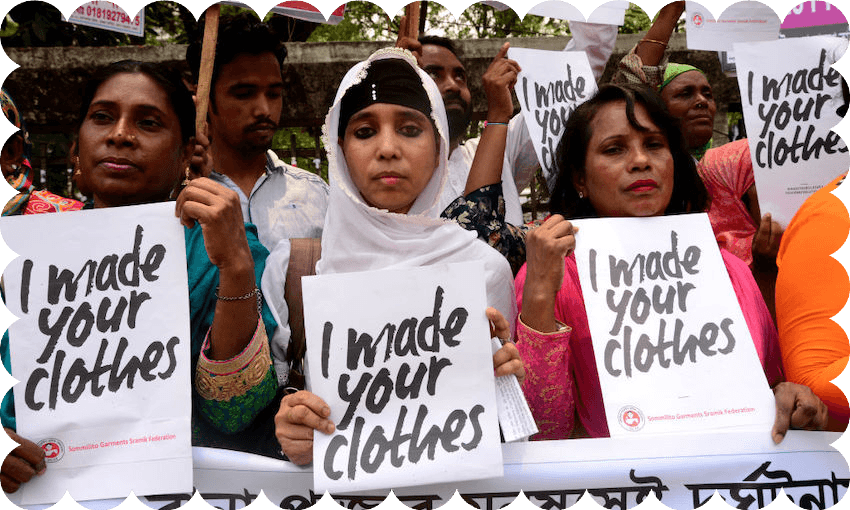On this day in 2013 more than a thousand people died in the horrific Rana Plaza collapse. It was a tragedy that exposed the dark underbelly of the global fashion industry, write World Vision’s Lydia Hollister Jones and Tearfund’s Morgan Theakston
Nine years ago today, the Rana Plaza building in Dhaka, Bangladesh, collapsed. Five garment factories, supplying major international brands, were reduced to rubble. That day 1,132 people died and more than 2,500 were injured.
They were workers who were also mums, desperate to earn enough to feed their families. They were sisters supporting their younger siblings to stay in school. They lost their lives because they weren’t safe while they worked to produce the clothes we buy without a second thought.
Today’s anniversary marks not only the collapse of Rana Plaza and the human lives lost, but also the day that many in New Zealand woke up to the appalling working conditions that millions of garment workers face daily to make our clothes. Conditions that in many cases constitute modern slavery.
Since the collapse of Rana Plaza, we’ve learnt more about modern slavery and our connection to it, but what have we done about it? Slavery is still a daily reality for millions. Right now, there are 40 million people living in slavery around the world and 10 million of these are children. They are entrapped in forced labour, debt bondage, forced marriage and human trafficking.
World Vision New Zealand’s research reveals that as a country we imported an estimated $3.1 billion of products that were potentially implicated in modern slavery in 2019. The clothing industry alone accounted for 40% of those “risky” imports.
Tearfund’s 2021 Ethical Fashion Report shows that only half of the largest apparel companies in New Zealand assessed the modern slavery risks in their supply chains. On top of this, fewer than half of companies had a process to remedy child labour and forced labour.
Tearfund found that roughly a third of companies hadn’t traced all of their direct suppliers. This lack of visibility means many companies don’t even know where their products are being made or who is making them.
Unlike many other places, including Australia, the UK, and many countries in the EU, New Zealand doesn’t have any legislation in place to require companies to identify and address modern slavery in their supply chains. This means many businesses simply ignore the impact on the people who produce their goods.
People like Navani. A former garment worker in Dhaka, Navani dreams of being able to give her three sons an education so they can have a better life. She shared with us the harrowing conditions she endured while working in the garment industry: “My working hours were 8am to 8pm, sometimes 10pm, sometimes I worked overnight. There was a lot of pressure to get things finished. It was possible to go to the toilet and have a drink of water, but we had to be very quick otherwise the supervisors would shout at us. There was verbal abuse and there was child labour.”
We know that New Zealanders support dignity and fairness for workers like Navani. Last year, more than 37,000 Kiwis signed a petition calling for legislation to address modern slavery. The business community echoed that support when more than 100 companies signed an open letter in support of a modern slavery law. Just weeks ago, the government launched a public consultation on a proposed law to address the issue.
These are promising signs, but we’re not there yet. We need legislation that ensures everybody – the government, not-for-profits, and all NZ businesses – knows the part they must play in ending slavery and worker exploitation. We need legislation that means we do more than just report and identify risks and cases of modern slavery and exploitation in our supply chains – we need a law that requires us to take action to address what we find. And we need the government to have systems in place to make sure we meet these requirements. This is the kind of law we’re calling for together.
We’re encouraged by the moves that the government is making in asking for feedback on a proposed modern slavery law. We’re urging New Zealanders to show their support by making a submission in support of such a law by the beginning of June.
This time next year will mark a decade since the Rana Plaza tragedy. We hope we’ll look back and say that Aotearoa has acted for fairness and dignity for everyone. That we’re doing what we can as a country to ensure that the cost of our clothes is not at the expense of other human beings. New Zealand needs modern slavery legislation, and we need it now.
World Vision and Tearfund New Zealand are calling on New Zealanders to show their support for a law addressing modern slavery by making a submission here.



